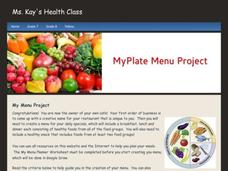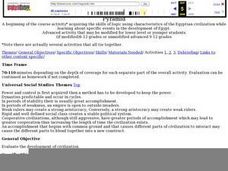Curated OER
Spill Your Guts
Students practice nutrition facts. In this health and nutrition lesson, students participate in a game in which two teams compete to "spill their guts" by quickly answering factual questions pertaining to nutrition. This lesson is...
Curated OER
Fruits and Vegetables in the Food System
Young scholars examine the importance of local markets. In this horticulture lesson, students examine the importance of local markets and food systems that can provide profit for growers, freshness, variety and quality.
Curated OER
Getting the Most Nutrition From Your Food
Fifth graders research the food pyramid. In this food pyramid lesson, 5th graders track their eating habits during the day. Later, students review their food log and place each item into the food pyramid.
Weebly
My Menu Project
If you don't mind using another teacher's website, this one has a simple project that would make a nice conclusion to your nutrition unit. Using a planning worksheet and peer review, nutrition nuts create a cafe menu using healthy foods....
Science Matters
Energy Flow
Budding scientists work collaboratively to reenact energy flow in a food chain. Scholars take on roles such as producer and consumer and perform tasks that symbolize energy flow in order to provide evidence of how much energy passes...
Polar Trec
Arctic Smorgasbord!
Two blooms of phytoplankton, instead of just one, now occur in the Arctic due to declining sea ice, which will have widespread effects on the marine life and climate. In small groups, participants build an Arctic food web with given...
Food Project
Trace The French Fry
How does locally grown produce sold at a farmer's market compare to a more complex industrial system in the way they each affect the environment, people, and the economy? Pupils explore the different types of food systems and how they...
California Academy of Science
Our Hungry Planet: Design Thinking Challenge
Scholars investigate an issue associated with food systems and design their own solutions. Working collaboratively, they follow each step in the design process to complete the 10th lesson of the 13-part Our Hungry Planet series.
Science Matters
Peanut Energy
How do humans get energy since they aren't mechanical and can't photosynthesize? Learners explore this question by relating potential energy in food to human energy levels. Scholars measure the change in mass and a change in temperature...
Early Childhood Learning and Knowlege Center
My Body My Senses
In a comprehensive unit of activities, learners explore the five senses. Youngsters discover the many different body parts and their functions that allow humans to have sense of sight, touch, smell, taste, and hearing. The best way to...
Curated OER
Diversity Food Groups
Students explore diversity in foods and people. In this diversity lesson, students explore diversity in foods and how things aren't always as they seem. This lesson is then applied to diversity in people.
Curated OER
Food, Families, and Festivals
In this festivals learning exercise, students work as a group and sort pictures of food into 2 groups: party foods and everyday foods. Students then discuss their favorite foods, celebrations with foods, quantities of food, and foods for...
Curated OER
Water Pollution and Food Chains
Sixth graders study the effect of pollution in our food chains. In this plant biology lesson, 6th graders first experiment with pollution by placing a carnation in colored water. Next they use a food chain triangle to see the concept of...
Curated OER
Food Makes the World Go Round
Fifth graders investigate the origins of foods they eat while they consider social justice issues. In this food sources lesson, 5th graders play a game and then research food distribution, food security, and hunger in the world today....
Curated OER
Food Webs
Learners research what food is eaten by the following organisms: penguins leopard seals, krill, elephant seals, petrels, albatross, fur seals, squid, insects and grass. They make a food web using the data they have gathered.
Curated OER
Demonstration of Cheese-Making Enzyme Magic
Students watch a demo which is a modification of an enzyme lab which is done as a "magic show". It's primary purpose is to tickle the curiosity of the student and grab interest before discussion of enzymes. It is also used to stimulate...
Curated OER
Marine Ecosystems
Young scholars identify producers and consumers and construct a food chain from four marine ecosystems. They describe the delicate balance among organisms in each environment. In groups, students discuss the human activities that upset...
Curated OER
Mouse Roulette
Students explore the food chain. To gain an understanding about the food web, students participate in a simulation where owlets are being fed by adult owls. Afterward, students examine the results of the role play to determine whether an...
Curated OER
We Need All Five!
Second graders review foods and their groups. They discuss the reasons why they need to eat from all five food groups. They try to write using only a few of their five fingers to see what happens when you don't use all five fingers.
Curated OER
The Riddle of the Playground Cave
Students discuss food groups and combination foods, and solve riddle story.
Curated OER
Pyramid
Students work in small groups as they are assigned one of the food groups. They decide how to act out one of the foods included in that group. Next, they discuss their favorite foods and where they fit on the food pyramid and examine the...
Curated OER
Traveling Through the Digestive System
Second graders learn about how the food is broken down in our bodies and the job of each body part involved in our digestive system. The utilize the CD ROM game, "Body Works." This wonderful game takes pupils through the human body's...
American Chemical Society
Can Liquids Dissolve in Water?
How does food coloring work? Classes watch a demonstration showing liquids dissolving in liquids. In groups, they then explore the ability of other liquids to dissolve in water (alcohol, mineral oil, and corn syrup) by setting up and...
Curated OER
Taco Grande
What do you use to chop an onion or brown the meat? Learners with special needs read through a taco recipe, then use it to complete three different academic development activities. They circle the best utensil for the job, match each...

























